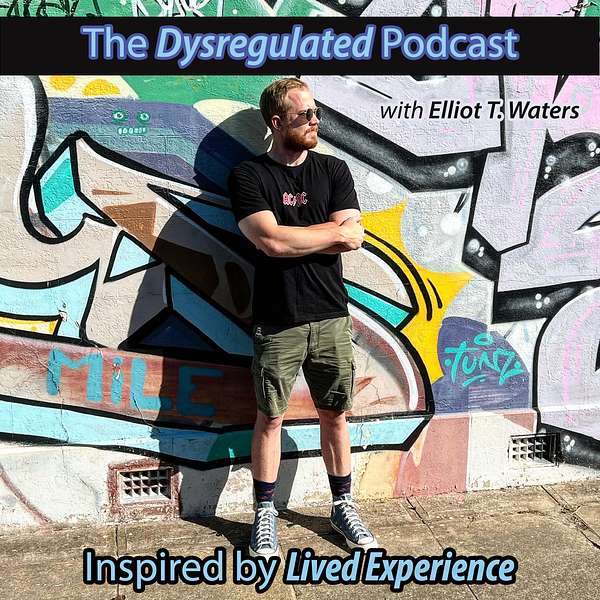
The Dysregulated Podcast
I live with anxiety, depression, ADHD, autism, OCD & BPD — and this podcast shares the hard-fought lessons I’ve learned along the way.
This is lived-experience mental health, told with complete honesty and zero filter, including the vulnerable and significant moments that continue to shape my life today.
Through personal reflections, therapy insights, interviews, nervous system regulation, and real-world struggles, I explore what it means to live with complex mental illness — grounded in psychological science and research.
The Dysregulated Podcast
DBT Skills: Pros and Cons
Discover Dialectical Behaviour Therapy (DBT) with 'The Dysregulated Podcast'!
Episode #3: Pros and Cons
--
Follow The Dysregulated Podcast:
Instagram – @elliot.t.waters
Facebook – The Dysregulated Podcast
YouTube – The Dysregulated Podcast (Official Channel)
Created by Elliot Waters — Inspired by lived experience.
Mental health insights, real stories, real conversations.
G'day everybody, my name is Elliot Waters, and you're listening to The Dysregulated Podcast. As always, thank you for tuning in.
Today's episode is part of the ongoing DBT skills series—yes, it's back! We're diving into a powerful skill today: Pros and Cons. Now, DBT—Dialectical Behavior Therapy—was originally developed for folks like me with borderline personality disorder and severe emotional dysregulation. But the beauty of these skills is that they’re useful for everyone. You don’t need a diagnosis to benefit from them.
So, what is the Pros and Cons skill?
This one falls under the Distress Tolerance category. It’s designed to help people make wise, balanced decisions, especially in moments of intense emotion, urges, or impulsivity. Unlike your everyday pros and cons list, this one zooms out—it helps you weigh short-term relief against long-term consequences. It encourages you to pause, reflect, and choose wisely.
Here’s how it works: You create a simple chart with four sections:
- Pros of acting on the urge
- Cons of acting on the urge
- Pros of resisting the urge
- Cons of resisting the urge
This isn’t just about logic—it’s about emotion, too. It brings together both sides of the brain: emotional mind and rational mind. And when those two join forces? That’s Wise Mind—the DBT concept we explored in a previous episode. Wise Mind is where you make decisions that align with your values and long-term goals.
Let’s look at a real-life example from yours truly. Lately, I’ve been struggling to apply for jobs. Every time I open an application, a tidal wave of anxiety, self-doubt, and imposter syndrome floods in. My brain screams: “What if I don’t get it? What if I fail? What if I embarrass myself?”
So, what happens? I avoid it. I scroll my phone. I procrastinate. But deep down, I know this pattern. It’s avoidance—and it keeps me stuck.
That’s where the Pros and Cons skill comes in.
I grab a notebook and split the page:
Option 1: Avoiding the job application Pros: No risk of rejection. No immediate stress. I feel safe… for now. Cons: Still unemployed. Still stuck. Reinforces avoidance. Leads to regret. Zero chance at change.
Option 2: Applying for the job Pros: Chance of getting it. Good practice. Shows action. Builds confidence. Opens the door to change. Cons: Risk of rejection. Time and energy required. Might hurt if I don’t succeed.
When I step back and look at that list, it’s clear: applying—even if I fail—is better than not trying at all. Avoidance might feel easier now, but long-term? It’s a dead end.
So, I apply—not because I’m magically confident, but because I know it’s the right move. That’s the power of Pros and Cons. It helps you break through emotional fog and act in line with your values.
Some reminders:
- Emotions aren’t the enemy. They just don’t always have the full picture.
- This skill isn’t about convincing yourself to do something—it’s about making an informed, balanced decision.
- Don’t let your emotional mind or rational mind dominate. Aim for Wise Mind—the middle path.
This skill is useful for so many situations:
- When you're stuck in indecision (e.g., Should I move house? End a relationship?)
- When you feel an urge to act impulsively (e.g., self-harm, overspending, quitting a job)
- When you’re tempted to avoid something important (e.g., therapy, job interviews)
So keep a notebook, a whiteboard, your Notes app—whatever works. Use it in the moment. Get it down. Look at it. Let it help you find your way through.
And if you’re like me, struggling with emotional regulation, BPD, ADHD—this stuff is gold. It gives structure to the chaos.
If this episode helped you, let me know! Message me on Instagram @elliot.t.waters. And please share the show with someone who might need it. Like, subscribe, and rate—it all helps the algorithm and keeps this little community growing.
Thanks again for tuning in. Until next time, keep working toward that Wise Mind!
